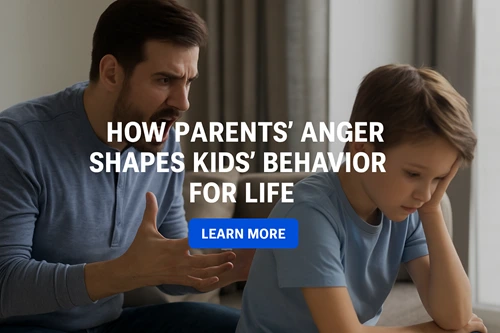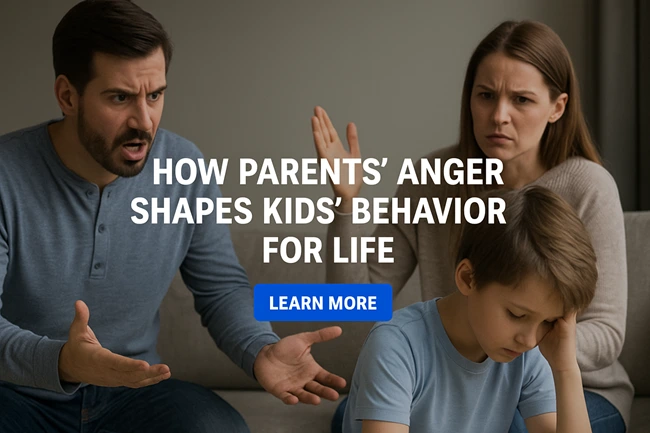The Invisible Mark of a Parent’s Temper
They say childhood is a delicate piece of porcelain—once cracked, even the finest glue leaves behind lines that never fade. For many children, those cracks aren’t caused by strangers or sudden tragedies, but by the daily outbursts of anger, irritation, and frustration from the people they love and trust the most—their parents.
Every eye-roll, every loud scream, every moment of cold silence—these aren’t just fleeting emotional lapses. They leave impressions, silent messages etched into the child’s emotional DNA. And unlike bruises that heal, these emotional wounds can linger for a lifetime, subtly steering the child’s personality, confidence, and emotional resilience.
Let’s explore how a parent’s frustration can quietly become a child’s lifelong behavioral blueprint—and why breaking this cycle is not just important, but urgent.

The Emotional Mirror: Children Absorb More Than We Know
Children don’t just listen to what parents say—they absorb how they feel. When a child sees a parent shouting or sulking in frustration, their young mind starts making associations. “Is it my fault?” “Is this how I should react when things go wrong?” “Is anger the only way to get heard?”
Parents are emotional mirrors for their children. The way you manage your stress, disappointments, and outbursts becomes your child’s emotional vocabulary. If anger is a frequent guest at home, children learn to either imitate it—or fear it.
Over time, the home environment sets the baseline for emotional regulation. A home filled with warmth and understanding creates emotionally intelligent kids. A home dominated by anger and volatility breeds insecurity, fear, or defiance.
The Silent Lessons: What Anger Teaches Without Words
Parental anger doesn’t always come in loud, abusive forms. Sometimes, it’s the irritation in a rushed morning routine. The frustrated sigh when your child spills milk. The dismissive tone when they ask too many questions.
These moments teach children subtle but damaging lessons:
- Love is conditional: If affection disappears the moment something goes wrong, children start believing they must “earn” love.
- Mistakes are dangerous: Children become afraid of making mistakes, leading to anxiety, low self-worth, or perfectionism.
- Anger equals power: If they see anger “win” arguments or get people to listen, they begin mimicking the same behavior.
- Emotions should be suppressed: If parents react badly to emotional outbursts, children may learn to bottle up their own feelings.
These aren’t just childhood tendencies. They often follow the child into adulthood—in friendships, relationships, at work, and even as future parents themselves.
Behavioral Impact: Shaping Who They Become
- Aggression and Defiance
A child who grows up around shouting and criticism may develop aggressive tendencies. They learn to raise their voice because that’s what they were taught works. Or, they rebel—testing boundaries not to be bad, but to reclaim control.
- Low Self-Esteem and Anxiety
When frustration is the default parental tone, children internalize it. They start to believe they’re the problem. Over time, this chips away at their confidence and builds a constant fear of failure or rejection.
- People-Pleasing Tendencies
Some children go the opposite route—they become overly obedient, eager to please, and terrified of conflict. They learn to shrink themselves emotionally to avoid becoming the target of their parent’s temper.
- Emotional Disconnection
Repeated exposure to parental anger may cause children to shut down emotionally. They become experts at hiding their feelings, fearing vulnerability. This emotional disconnect often shows up later in adult relationships, making intimacy and trust difficult.
Teenage Years: Where The Impact Deepens
The teenage phase is already an emotional rollercoaster. Add a layer of unresolved trauma from childhood anger, and it becomes a storm. Teens raised in volatile households may:
- Withdraw from parents, leading to a communication breakdown.
- Seek validation from peers, even in unhealthy friendships or relationships.
- Turn to risky behaviors—smoking, drinking, or rebellion—as forms of emotional escape.
- Develop mental health issues like depression, anxiety, or eating disorders.
This phase either strengthens or shatters the bond between parent and child. If anger continues to dominate, the emotional chasm widens, and healing becomes harder as the child grows older.
The Long-Term Echo: Adult Behavior Built on Childhood Pain
Even when the child grows up and leaves home, the impact doesn’t disappear. It simply transforms:
- Struggles with authority figures: Adults may fear criticism or have trust issues with bosses, mentors, or partners.
- Emotional instability: Mood swings, emotional dependency, or difficulty expressing feelings are often rooted in childhood suppression.
- Parenting challenges: Many repeat the same patterns with their own children, perpetuating the cycle.
- Chronic guilt or shame: The internal voice shaped by a parent’s frustration continues to whisper doubts and insecurities.
Unaddressed, these patterns can take years of therapy or introspection to identify and undo.
Breaking the Cycle: It Starts With Awareness
It’s easy to lose patience. Life is demanding. Work, finances, personal struggles—all pile up. But children don’t see the bills or stress. They only see their parent’s tone, body language, and reaction.
Here’s how parents can begin to shift the narrative:
1. Pause Before You React
Anger is a normal emotion, but how it’s expressed is what matters. If you’re about to yell, take a few seconds to breathe. Walk out of the room if needed. A small pause can prevent a lifetime of guilt.
2. Name and Acknowledge Emotions
Instead of “Why are you always so clumsy?”, try “I’m feeling really stressed right now, can we talk in a bit?” This teaches children that emotions are okay—and manageable.
3. Apologize When You Overreact
Many parents believe that apologizing weakens authority. It doesn’t. It builds respect. When you say, “I’m sorry I shouted, I shouldn’t have,” your child learns accountability.
4. Use Calm Discipline
Punishment in anger only fuels fear. Discipline should be about teaching, not threatening. Replace yelling with clear, calm consequences.
5. Create a Safe Emotional Environment
Encourage open conversations. Let your child share their feelings without fear of being dismissed. When emotions are respected at home, children develop emotional maturity.
Rewriting the Story: Your Influence is Power
It’s never too late to change. Even if you’ve made mistakes in the past, every moment forward is a chance to build a better emotional home for your child. Your behavior can either be their baggage—or their foundation.
You don’t have to be perfect. You just have to be aware. The goal isn’t to never feel anger—but to show your child how to manage it with empathy, maturity, and grace.
Conclusion: The Seeds We Plant Today Bloom in Tomorrow’s Heart
Children remember. Not the toys, not the clothes, not even the food. They remember how you made them feel. Every reaction is a seed. Plant patience, and you grow confidence. Plant rage, and you grow fear.
The legacy of your parenting isn’t in what you provide—it’s in how you behave.
So the next time frustration rises like a storm, remember: Your child is watching. Learning. Becoming.
You’re not just raising a child. You’re shaping an adult who will one day reflect the emotional blueprint you gave them.
Make it one of love, strength, and understanding.
How Parents Anger Shapes Kids Behaviour : FAQ
Q1: Is it okay for parents to get angry sometimes?
Yes, anger is a natural emotion. What matters is how it’s expressed. Calm communication is always better than explosive reactions.
Q2: Can children recover from the impact of parental anger?
Absolutely. With love, consistency, and open dialogue, children can heal and develop emotional resilience—even if mistakes were made in the past.
Q3: What are signs that a child is affected by a parent’s anger?
Common signs include low self-esteem, withdrawal, anxiety, aggression, or people-pleasing behavior. Observing changes in mood or behavior is key.
Q4: How can I fix my relationship with my child if I’ve been too harsh?
Start by acknowledging your mistakes. Apologize sincerely. Make conscious efforts to change. Show love through actions, not just words.
Q5: Should I seek professional help if I struggle with anger?
Yes. There’s no shame in seeking therapy or counseling. It’s a sign of strength and commitment to your family’s well-being.
You may also like to read about:
- Obesity : A Rising Concern in Kids Today – What Every Parent Needs to Know
- Why Letting Your Child Fail Might Be the Best Gift You Ever Give Them
- Fun Educational Games to Play at Home: Learn, Laugh, and Grow Together
- Is Your Child Drinking Soda—Or Is Soda Drinking Their Bones? Find Out Now
- 10 Gentle Parenting Secrets to Raise Kind, Respectful, and Well-Behaved Kids

Hi, I’m Prashant Jain — a curious soul, storyteller, and content creator at heart.I’ve always been drawn to the world of entertainment, travel, sports, health & lifestyle — not just as a writer, but as someone who genuinely lives these experiences. Whether I’m binge-watching the latest OTT series, exploring offbeat spiritual destinations in India, or diving deep into wellness routines and cricket match insights, I love sharing what I discover with like-minded readers.
PopNewsBlend is my way of blending personal journeys with meaningful stories — ones that inform, inspire, and keep you ahead of the curve. Everything I write comes from real observations, hands-on experiences, and a deep passion for understanding the world around us.
Discover more from Popnewsblend
Subscribe to get the latest posts sent to your email.






Pingback: 10 Unconscious Parenting Habits That Promote Gender Bias in Children